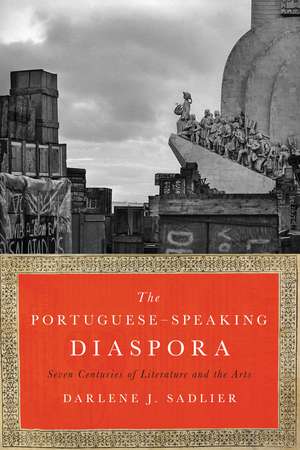The Portuguese-Speaking Diaspora: Seven Centuries of Literature and the Arts
Autor Darlene J. Sadlieren Limba Engleză Paperback – 15 noi 2016
Based on a broad array of written and visual materials, including historiography, letters, memoirs, plays, poetry, fiction, cartographic imagery, paintings, photographs, and films, The Portuguese-Speaking Diaspora is the first detailed analysis of the different and sometimes conflicting cultural productions of the imperial diaspora in its heyday and an important context for understanding the more complex and broader-based culture of population travel and displacement from the former colonies to present-day “homelands.” The topics that Darlene J. Sadlier discusses include exploration and settlement by the Portuguese in different parts of the empire; the Black Atlantic slave trade; nineteenth-century travel and Orientalist imaginings; the colonial wars; and the return of populations to Portugal following African independence. A wide-ranging study of the art and literature of these and other diasporic movements, this book is a major contribution to the growing field of Lusophone studies.
Preț: 257.55 lei
Nou
Puncte Express: 386
Preț estimativ în valută:
49.28€ • 52.70$ • 41.09£
49.28€ • 52.70$ • 41.09£
Carte indisponibilă temporar
Doresc să fiu notificat când acest titlu va fi disponibil:
Se trimite...
Preluare comenzi: 021 569.72.76
Specificații
ISBN-13: 9781477311486
ISBN-10: 1477311483
Pagini: 314
Dimensiuni: 152 x 229 x 36 mm
Greutate: 0.54 kg
Editura: University of Texas Press
Colecția University of Texas Press
ISBN-10: 1477311483
Pagini: 314
Dimensiuni: 152 x 229 x 36 mm
Greutate: 0.54 kg
Editura: University of Texas Press
Colecția University of Texas Press
Notă biografică
Darlene J. Sadlier is professor emerita of Spanish and Portuguese at Indiana University Bloomington. Her previous books include Americans All: Good Neighbor Cultural Diplomacy in World War II and Brazil Imagined: 1500 to the Present.
Cuprins
Acknowledgments
Introduction
Chapter One. The Imperial Diaspora
Chapter Two. The Lusophone African Diaspora
Chapter Three. Oriental Imaginings and Travel at the Turn of the Twentieth Century
Chapter Four. Into the Wilderness: The Race for Africa and the Promise of Brazil
Chapter Five. The Casa dos Estudantes do Império and Mensagem
Chapter Six. A Lusotropicalist Tourist and Soldiers, East Indians, and Cape Verdeans on the Move
Chapter Seven. War in Africa and the Global Economy: Leaving Home and Returning
Epilogue: The Portuguese-Speaking Diaspora and “Lusofonia”
Notes
Bibliography
Index
Introduction
Chapter One. The Imperial Diaspora
Chapter Two. The Lusophone African Diaspora
Chapter Three. Oriental Imaginings and Travel at the Turn of the Twentieth Century
Chapter Four. Into the Wilderness: The Race for Africa and the Promise of Brazil
Chapter Five. The Casa dos Estudantes do Império and Mensagem
Chapter Six. A Lusotropicalist Tourist and Soldiers, East Indians, and Cape Verdeans on the Move
Chapter Seven. War in Africa and the Global Economy: Leaving Home and Returning
Epilogue: The Portuguese-Speaking Diaspora and “Lusofonia”
Notes
Bibliography
Index
Recenzii
Highly recommended for courses on diversity, history and cultural studies, undergraduate and graduate students and researchers.
Sadlier's work offers a wide-ranging survey of diasporic literature and art of the Portuguese Empire. It creatively uses an impressive diversity of sources and media to reveal perspectives reaching beyond the standard Portuguese literary canon. Moreover, the global scope of the work is ambitious...The Portuguese-Speaking Diaspora consistently explores themes of estrangement, disillusion, and longing in colonialism.
An extensive survey of diasporic literature and art of the Portuguese Empire...The book is an important source to study the culture of Portuguese territories
in the East...a pleasant reading experience for all those who are interested in understanding the Portuguese diaspora.
in the East...a pleasant reading experience for all those who are interested in understanding the Portuguese diaspora.
Descriere
Spanning seven centuries and four continents, this comprehensive survey of the Portuguese diaspora connects literary and artistic expression (including film) with the sociopolitical and economic factors that drove population migrations.
